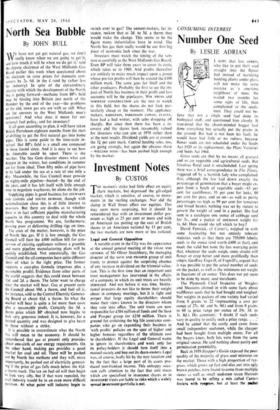North Sea Bubble
By JOHN BULL
wE have not yet got natural gas, we don't really know when we are going to gait, and how much it will be when we do get it,' said the deputy chairman of the West Midlands Gas Board earlier this week when questioned about the decision to raise prices for domestic con- sumers by 2s. 6d. in the f (and by rather less for industry). In spite of the extraordinary alacrity with which the development of the North Sea is going forward—methane from BP's field may be hissing into Britain just north of the Humber by the end of the year—the problems of the old, town gas era are with us still. What are the answers to the West Midlands man's questions? And what does it mean for our national fuel policy, and for investors?
If all goes according to plan, it will have taken British Petroleum eighteen months from the start of drilling to get the first natural gas into home pipes. This is some guide to the time-scale in- volved. But BP's field is a small one compared to those found since. And it is easy to see how the timetable could be upset. There is the weather. The Sea Gem disaster shows what can happen in the winter, but conditions in summer are far from ideal. Then fifty miles of pipe have to be laid under the sea at a rate of one mile a day. Meanwhile, the Gas Council must provide an eighty-mile pipeline—buried—by the end,of the year, and it has left itself with little enough time to negotiate wayleaves, let alone do the job.
Supplying pipes is good business for STEWARTS AND LLOYDS and SOUTH DURHAM, though with nationalisation close this is of little interest to investors. But there are doubts as to whether there is in fact sufficient pipeline manufacturing capacity in this country to deal with the whole North Sea programme. We are, furthermore, proving poor at delivering drilling rigs on time.
The crux of the matter, however, is the price of North Sea gas. If it is low enough, the Gas Council will foot the £400 million bill for con- version of existing appliances without a grumble and more pipeline manufacturing plant will be quickly established. Not unnaturally, the Gas Council and the oil companies have quite different ideas of what is the right price. The former supports a cost-plus formula (expenses plus a reasonable profit). Evidence from other parts of the world suggests that this could mean between lid. and 2d. a therm. The latter want to charge what the market will bear. Gas at present costs the Council about 10d. a therm, and fuel oil is, for instance, sold to the Central Electrity Generat- ing Board at about qd. a therm. So what the market will bear is quite a lot more than costs Tips a reasonable profit.- Certainly the 5d. a therm price which BP obtained now begins to look very generous indeed. It is, however, for a limited quantity and was designed to give heart to those without a strike.
It is possible to overestimate what the North Sea will mean to the economy. It should be remembered that gas at present only provides about one-sixth of our energy requirements. On the other hand, making gas provides a good market for coal and oil. These will be pushed out by North Sea methane and they will, more importantly, be pushed out of electricity generat- ing if the price of gas falls much below the 44d. a therm mark. The tax on fuel oil will then begin to took very silly, but if that were repealed, the coal industry would be in an even more difficult position. At what point will industry begin to switch over to gas? The cement-makers, for in- stance, reckon that at 2d. to 3d. a therm they would make the change. This seems to be the figure many industrialists have in mind. The North Sea gas then really would be our first big piece of economic luck since the war.
Investors must watch the timing of the ven- ture as carefully as the West Midlands Gas Board. Even BP will take three years to cover its costs, which takes us to 1969. And profits thereafter are unlikely to make much impact upon a group whose pre-tax profits will then be around the £100 million mark. The same goes for Shell and the other producers. Probably the first to see the im- pact of North Sea business in their profit and loss accounts will be the pipelayers. WM. PRESS and NORWEST CONSTRUCTION are the two to watch in this field, but the shares do not look par- ticularly cheap at the moment. The appliance- makers, RADIATION, PARKINSON COWAN, FLAVEL, have had a bad winter, with sales dropping off sharply. But since then there has been a re- covery and the shares look reasonably valued for investors who can aim at 1970 rather than at the next results. Dividend yields are at around the 51 per cent mark. Central heating sales, too, are going strongly, but again the obvious share —WILLIAM SUGG—has been pushed high enough by the market.


































 Previous page
Previous page